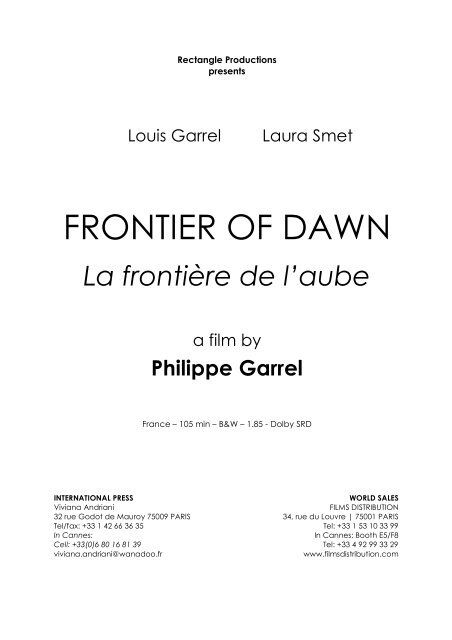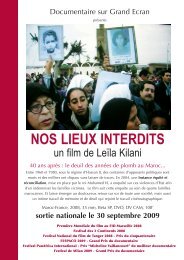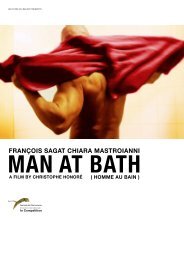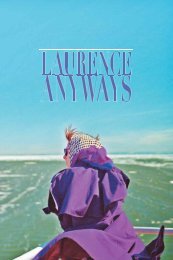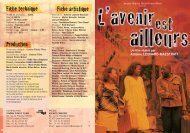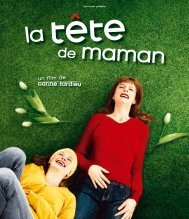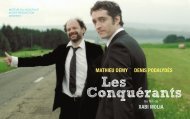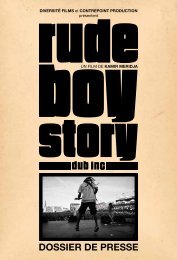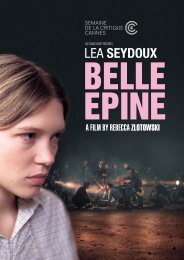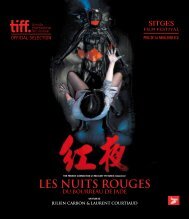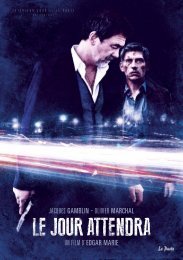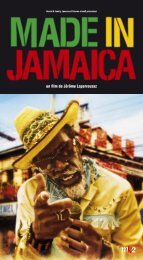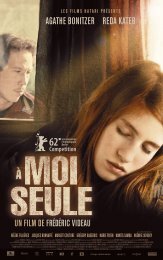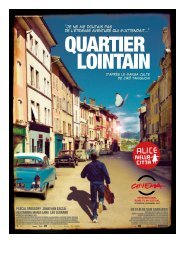FRONTIER OF DAWN
FRONTIER OF DAWN - Unifrance
FRONTIER OF DAWN - Unifrance
- No tags were found...
Create successful ePaper yourself
Turn your PDF publications into a flip-book with our unique Google optimized e-Paper software.
Rectangle Productions<br />
presents<br />
Louis Garrel<br />
Laura Smet<br />
<strong>FRONTIER</strong> <strong>OF</strong> <strong>DAWN</strong><br />
La frontière de l’aube<br />
a film by<br />
Philippe Garrel<br />
France – 105 min – B&W – 1.85 - Dolby SRD<br />
INTERNATIONAL PRESS<br />
Viviana Andriani<br />
32 rue Godot de Mauroy 75009 PARIS<br />
Tel/fax: +33 1 42 66 36 35<br />
In Cannes:<br />
Cell: +33(0)6 80 16 81 39<br />
viviana.andriani@wanadoo.fr<br />
WORLD SALES<br />
FILMS DISTRIBUTION<br />
34, rue du Louvre | 75001 PARIS<br />
Tel: +33 1 53 10 33 99<br />
In Cannes: Booth E5/F8<br />
Tel: +33 4 92 99 33 29<br />
www.filmsdistribution.com<br />
In Cannes
SYNOPSIS<br />
Carole, a celebrity neglected by her husband, falls for François, a young<br />
photographer. Returning from a business trip the husband surprises them, and<br />
the lovers have to end their relationship. Carole gradually drifts into madness<br />
and commits suicide.<br />
One year later, a few hours before his wedding, François has a vision. It’s<br />
Carole, calling him from the other world…
INTERVIEW WITH PHILIPPE GARREL<br />
How do you explain the title, Frontier of Dawn?<br />
While I was writing it, the film was called Heaven of the Angels, an expression I found in<br />
Blanche ou l’oubli by Louis Aragon. I liked it a lot but I was put off by the neo-Catholic side.<br />
And one night, at four in the morning, I came up with Frontier of Dawn, which evoked both<br />
the suicide and the ghost themes. I made the film with this title in mind and it gave me the key<br />
to each scene. Maybe the title is too deliberately poetic. I knew a director, Pierre Romans,<br />
who said an actor must never act poetic and to be poetic, you have to act in a realistic<br />
manner, with a trivial element. I agreed with him and ever since, I’ve been thinking that way<br />
about everything, including the way I compose shots. Poetry in cinema can only exist<br />
unconsciously. It comes out if the film has a soul.<br />
Where does this story of an apparition come from?<br />
My friend Frédéric Pardo, the late painter, gave me a novel by Théophile Gautier, Spirite, the<br />
story of a woman who appears in a mirror after killing herself and summons a man to the<br />
afterlife. In Gautier’s story, she had never met the man. She fantasized about him, entered a<br />
convent and committed suicide the day she realized she would never have him. One day,<br />
when the man is about to get married, the woman appears to him and tells her story. I<br />
thought this tale of an apparition was very beautiful but at the same time, not very<br />
cinematographic. Then I started thinking about telling the story of a woman committing<br />
suicide, reappearing in a mirror and luring towards death the man she had an unhappy affair<br />
with. I am a rationalist but I think the supernatural is a rich vein in cinema, if it is used the way<br />
the surrealists used it. The supernatural is useful to make art flourish. If you make a film about<br />
tables turning, it works really well. I didn’t want to use digital special effects or synthesis<br />
images. I preferred Jean Cocteau-style makeshift effects. A two-way mirror or lighting inside a<br />
mirror can make a ghostly apparition pretty believable.<br />
Why did you shoot in black and white?<br />
Because of the apparitions! I couldn’t make a film like this in color. Black and white takes you<br />
more easily into an imaginary world. We are more open to the idea of someone appearing in<br />
a mirror. I don’t use black and white on a whim. For Regular Lovers, it was justified by the<br />
difficulty of reenactment. You can’t do May ‘68 in color! By choosing black and white, half<br />
the work was done.<br />
How did you choose the actors?<br />
My working method has developed a lot since The Birth of Love, in terms of directing actors.<br />
Cinema is great as long as the acting is good, which means good directing. It’s at the heart of<br />
everything. If a scene doesn’t work, if a film seems unconvincing, it is because the actors are<br />
bad, or there is a bad vibe on the set. Since 1995, I’ve started really working at a job that I<br />
had already touched on beforehand: teaching dramatic art. After five years at the<br />
Conservatoire and two years running a joint class between the Conservatoire and the Fémis, I<br />
worked at the TNS recently and next year I’m going back to the Conservatoire. I get them to<br />
play scenes in front of the camera, taking them out in the streets, to cafés, to real settings, to<br />
get them to understand that in natural settings, you can’t act like you do in the theater, even<br />
if the acting method is the same. The pace is different. In the evening, we watch the rushes<br />
and talk about it. For them, it’s essential. For me, it’s like training. When I arrive on a set every<br />
two or three years, it’s like I’ve never stopped shooting if I’ve been working with very good<br />
students. What I must be losing in my grip on the world (as you get older, you become more<br />
and more alienated), I compensate for by more sophisticated directing of actors. I think now I<br />
could work with anybody, whatever his or her experience… and before I didn’t know that. But<br />
I haven’t come up with anything new. During a conference at the IDHEC, Robert Bresson<br />
explained that each time he chose someone to play a part, he worked with the person every<br />
day for three months! When I worked with Mehdi Belhaj Kacem, I did the same thing, as if he<br />
was one of my students. It’s nothing magic.
Clémentine Poidatz, the actress who plays Eve, is one of your students?<br />
She’s a girl from the Conservatoire. Like Julia Faure in Wild Innocence, which is when I started<br />
getting students to play several parts. In Regular Lovers all the roles were played by my<br />
students. It’s the same for Frontier of Dawn, with the exception of Laura Smet. Even Louis<br />
[Garrel] was one of my students, which created this thing… the teacher’s son… but it allowed<br />
us both to relate to each other in a simple, up-front way.<br />
For my last two films, I asked the production to rent me a theater rehearsal room and every<br />
Saturday afternoon, we rehearsed all the parts… So when I shoot, it’s over fast. One take is<br />
enough because they’ve been working on the part for a year! There’s a method! They say my<br />
method is the opposite of Jacques Doillon’s who does 15 takes when I do one. But it’s<br />
because I get them to rehearse. This way of doing things has economic advantages. It’s also<br />
a way of encouraging producers to let me shoot: It’s cheaper.<br />
This is the second time you have worked with your son, Louis Garrel. You have sometimes<br />
appeared in your films yourself. Has he become your alter ego?<br />
I don’t like acting. I did it in Les Baisers de secours because Doillon was supposed to play the<br />
part of the director and he pulled out at the last minute, three weeks before, saying, “Oh la la,<br />
I can’t, I’m too caught up in my own film,” which I understand because when people ask me<br />
to act I always say no. I hate it. For a while, I directed my father, Maurice. Now I direct Louis.<br />
It’s also a way of dealing with time, passing things on between the three of us and from<br />
generation to generation. Louis is not just himself. He embodies his generation like I did mine<br />
at the same age.<br />
And Laura Smet?<br />
The film’s producer, Edouard Weil, did Eager Bodies by Xavier Giannoli. One night, they gave<br />
me a DVD of the film and I thought she had a presence. It is as if I’d taken an actor from their<br />
troupe into my own. I asked to meet her to see if it would work with Louis, because when you<br />
direct actors, you have to know how to match people. When you put two actors together,<br />
either you have two individuals who can work and question each other, or you have two<br />
actors side by side and there’s nothing you can do. You can work as much as you want, if two<br />
actors remain two actors, it’s over. It is a question of chemistry and approach. Laura has<br />
become an extra student, except I soon saw that she is really an actress. She’s good.<br />
Carole, her character, goes through a session of electroshock therapy. Is this a reference to<br />
what happened to you in Rome when you were shooting The Inner Scar?<br />
I had them reconstruct the room where I had electroshocks, from memory, with the<br />
straightjacket and the lead table. A specialist confirmed that it happens exactly like that but<br />
inevitably, people tell me it looks fake, like something out of Fritz Lang! Yes, I identify with it. I<br />
feel implicated in what she is going through, when she is declared crazy as soon as she<br />
becomes political. This has remained very contemporary: when people start adhering to the<br />
revolution, they’re delirious! But these are just details. It’s a very fictional story.<br />
You are never caught in the act of immodesty in your films. You never film your actresses<br />
naked… What happens in the scene where François wants to photograph Carole in the bath<br />
and she says, “No, not like that!”<br />
They are both sincere with no secret agendas. François doesn’t mean any harm. It is the act<br />
itself that defiles something.<br />
“You have a camera where your heart should be,” said Anne Wiazemsky in L’Enfant secret…<br />
When art is your whole life, you have to push a little to be able to create, to exercise that art<br />
and you can be a boor without meaning it, without realizing, even if you are really careful.<br />
Like I said, I don’t like acting, but I know it is a really big deal, putting your body at the mercy<br />
of a camera! I know it’s complicated. Psychologically, art is as dangerous as mountain<br />
climbing. Taking on a character, then leaving it to go back to your everyday life is a huge<br />
thing! It can be a dangerous experience. As well as rational teaching, you need to teach<br />
safety. In any case, whether it is on a psychological or physical level, I always feel responsible
for the whole cast and crew when I shoot. I would never film a scene that involves the slightest<br />
risk. Art has to remain innocuous from that point of view.<br />
A man, a woman, two women, the couple, creation, desire or fear of having a child:<br />
compared to your other films, what is the issue at stake in this story?<br />
It is this intrusion of the supernatural, making a fantastical film like Franju. I fell flat on my face<br />
with the dream in Phantom Heart. I had written down my dreams and filmed the daily life of<br />
somebody, thinking if I showed these dreams it would be edifying. Yet the four dreams (that<br />
were too short) had no weight in the duration of the film and we couldn’t see how the dream<br />
was a reflection of reality. So I gave up on dreams in favor of the supernatural, to continue my<br />
exploration of the relationship between the real and the imaginary. The apparition in the<br />
mirror allows me to move into the waking dream. The fantastical winds up a story. I tell a real<br />
story that suddenly, in the final reel, is totally thrown into question. What I love so much in<br />
Rosemary’s baby by Roman Polanski is when the heroine realizes that all the characters she<br />
has met since the start are part of the devil’s cult: her husband, her doctor, her neighbors, etc.<br />
We see the film in a new light because of it. It takes everything we’ve seen to a new level. It’s<br />
mind blowing. Polanski’s film set off a paranoia attack in me. I went home hugging the walls<br />
(like I did after seeing the vision in Jean-Luc Godard’s Alphaville due to a slightly delirious<br />
interpretation. I understood that in this city, absolutely everyone worked for the police). I was<br />
looking for something like that. An event in the final reel that reveals the rest, the reason the<br />
story is being told.<br />
Why does Carole fall in love with François, and vice versa? Are there already hints of their<br />
separation when they meet? Eve, like Carole, is a very fragile young woman with a painful<br />
past. François is attracted to this type of woman.<br />
Yes but he is about to start a family with one and with the other, he only has a lover’s<br />
relationship. It is clearly not the same thing. In the first story, there are two loners clinging to<br />
each other. The second is more serious.<br />
What is behind the fear of having children?<br />
François loses his grip. He goes crazy. He has fallen in love with the apparition and starts loving<br />
her more than when she was alive. It has to show in the way the actor plays it. Once he has<br />
seen the apparition, his acting has to be hallucinatory, moving from impressionism to<br />
expressionism. So to avoid having a child, he jumps out the window… Nobody knows why<br />
people commit suicide.<br />
I remember a screening of Night Wind, followed by a debate in which women were mad at<br />
me for showing Catherine Deneuve attempting suicide. It was as if I had blasphemed. People<br />
couldn’t accept a roman noir that was truly dark. It’s unseemly. But I think art is a field where<br />
anything goes because it’s all pretence. I don’t think a suicide in cinema incites people to do<br />
it. On the contrary. But if you want to commit suicide and you come across a film that talks<br />
about it, the film has to tell it like it is, not shy away from it and then I think it is more like a<br />
vaccination. It should not cover up the unsaid. I don’t like clinical films, but tragedy is<br />
beautiful. Art makes you want to live. It stops young people doing stupid things… I will never<br />
commit suicide but it’s tragic art that saved me. When I was young, I had a very violent life<br />
and I made films that hid this violence, that were remedies.<br />
Now that I am a father, with a solid family life, I can make violent films because I don’t have a<br />
problem with balance.<br />
What about that comment about the day the last concentration camp survivor dies?<br />
I understood only recently what Sartre and Beauvoir said about why existentialism came<br />
about: after the holocaust, the horror of Nazism, we could no longer believe in mankind and<br />
all the philosophies that had previously been argued no longer held up. A new doctrine for<br />
daily life had to be invented.<br />
How do you approach the music?<br />
When you direct an actor, if you want him to be funny or moving, he has to focus on anything<br />
but being funny or moving. He has to be sincere. Music is the same thing. Before I add the<br />
music, my films are not moving. You just have to add three notes and what is latent is
evealed. That’s what it’s for. It paints emotions. I do it in an auditorium in front of the screen.<br />
We project the film and I have it played over the footage, with musicians, live: a pianist and a<br />
violinist. Without music, there is the risk of the film being too cerebral, considered, dry and<br />
cold. The music is made to measure, to reintroduce emotions and classicism. I infuse it<br />
instinctively. It is like painting. When you take to a canvas with a paintbrush, there is no going<br />
back. It is gestural.<br />
Is it the last creative act, after editing?<br />
I shoot in chronological order to create scenes from one day to the next so the character<br />
plays his role with no contradictions. And I edit while the film is being made, gradually, like<br />
they did during the Nouvelle Vague. That way, if I get something wrong, I can shoot it again<br />
immediately. The last four films were made that way. The great thing about it is when you<br />
realize, after the third or fourth shot of the film that you’ve found the door to your set again,<br />
you get back the pleasure and the right to be an artist, as if you had lost it between two<br />
films…
Philippe GARREL<br />
filmography<br />
2008 La Frontière de l’aube (Frontier of Dawn)<br />
2004 Les Amants Réguliers (Regular Lovers)<br />
Silver Lion at the Venice Film Festival 2005<br />
Louis Delluc Prize 2005<br />
Lumières Prize 2006<br />
César award for Most Promising Young Actor for Louis Garrel in 2006<br />
International Critics’ Prize at the European Film Academy<br />
2001 Sauvage Innocence (Wild Innocence)<br />
International Critics’ Prize at the Venice Film Festival 2001<br />
1998 Le Vent de la Nuit (Night Wind)<br />
1995 Le Cœur Fantôme (The Phantom Heart)<br />
1993 La Naissance de l’Amour (The Birth of Love)<br />
1990 J’entend plus la guitare (I Don’t Hear the Guitar Anymore)<br />
Silver Lion at the Venice Film Festival 1991<br />
1988 Les Baisers de Secours (Emergency Kisses)<br />
1985 Elle a passé tant d’heures sous les sunlights…<br />
1984 Rue Fontaine (sketch from Paris Seen By…20 Years Later)<br />
1983 Liberté, la Nuit<br />
1979 L’enfant Secret<br />
Jean Vigo Prize 1982<br />
1978 Le Bleu des Origines<br />
1976 Le Voyage au Jardin des Morts<br />
1975 Un Ange Passe<br />
Le Berceau de Cristal<br />
1974 Les Hautes Solitudes<br />
1972 Athanor (short film)<br />
1970 La Cicatrice Intérieure (The Inner Scar)<br />
1969 Le Lit de la Vierge<br />
1968 Le Révélateur<br />
La Concentration (Concentration)<br />
1967 Marie pour Mémoire (Marie for Memory)<br />
1965 Droit de Visite (short film)<br />
1964 Les Enfants Désaccordés (short film)
Louis GARREL<br />
2008 La frontière de l’aube (Frontier of Dawn), by Philippe Garrel<br />
2008 La belle personne, by Christophe Honoré<br />
2007 Actrices (Actresses), by Valeria Bruni Tedeschi<br />
2007 Les chansons d’amour (Love Songs), by Christophe Honoré<br />
2006 Dans Paris (Inside Paris), by Christophe Honoré<br />
2005 Les Amants Réguliers (Regular Lovers), by Philippe Garrel<br />
César award for Most Promising Young Actor 2005<br />
2004 Ma Mère (My Mother), by Christophe Honoré<br />
2003 Innocents, The Dreamers, by Bernardo Bertolucci<br />
2002 La Guerre à Paris (The War in Paris), by Yolande Zauberman<br />
2000 Ceci est mon corps (This is my Body), by Rodolphe Marconi<br />
Director<br />
2008 Mes copains (short film)<br />
Selected at Cannes 2008 Directors’ Fortnight<br />
Laura SMET<br />
2008 La frontière de l’aube (Frontier of Dawn), by Philippe Garrel<br />
2007 L’heure zéro (Towards Zero), by Pascal Thomas<br />
2006 Le Passager de l’Été, by Florence Moncorgé-Gabin<br />
2005 La Demoiselle d’Honneur (The Bridesmaid), by Claude Chabrol<br />
2004 La Femme de Gilles (Gilles’ Wife), by Frédéric Fonteyne<br />
2003 Les Corps Impatients (Eager Bodies), by Xavier Giannoli<br />
Romy Shneider Prize 2004<br />
Nomination for César award, Most Promising Young Actress 2004
CAST<br />
François<br />
Carole<br />
Eve<br />
Jean-Jacques<br />
Eve’s father<br />
Nathalie<br />
Louis Garrel<br />
Laura Smet<br />
Clémentine Poidatz<br />
Emmanuel Broche<br />
Olivier Massart<br />
Juliette Delègue<br />
CREW<br />
Director<br />
Philippe Garrel<br />
Screenplay<br />
Philippe Garrel, Marc Cholodenko, Arlette<br />
Langmann<br />
Cinematography William Lubtchansky<br />
Sound engineer<br />
Alexandre Abrard<br />
1 st Asst. Director Manuel Flèche<br />
Set designer<br />
Mathieu Menut<br />
Costumes<br />
Justine Pearce<br />
Film editing<br />
Yann Dedet<br />
Soundtrack<br />
Jean-Claude Vannier<br />
Mixing<br />
Thierry Delor<br />
Production Manager Guillaume Favreau<br />
Line Producer<br />
Karine Petite<br />
Producer<br />
Production<br />
In co-production with<br />
Edouard Weil<br />
Rectangle Productions<br />
StudioUrania<br />
With the participation of Canal Plus and Cinecinema<br />
With the support of Eurimages<br />
In association with Cofinova 4 and Arte/Cofinova 4<br />
With the support of Programme Media de la Communauté Européenne<br />
With the participation of Centre National de la Cinématographie<br />
With the support of Région Ile-de-France and CNC


